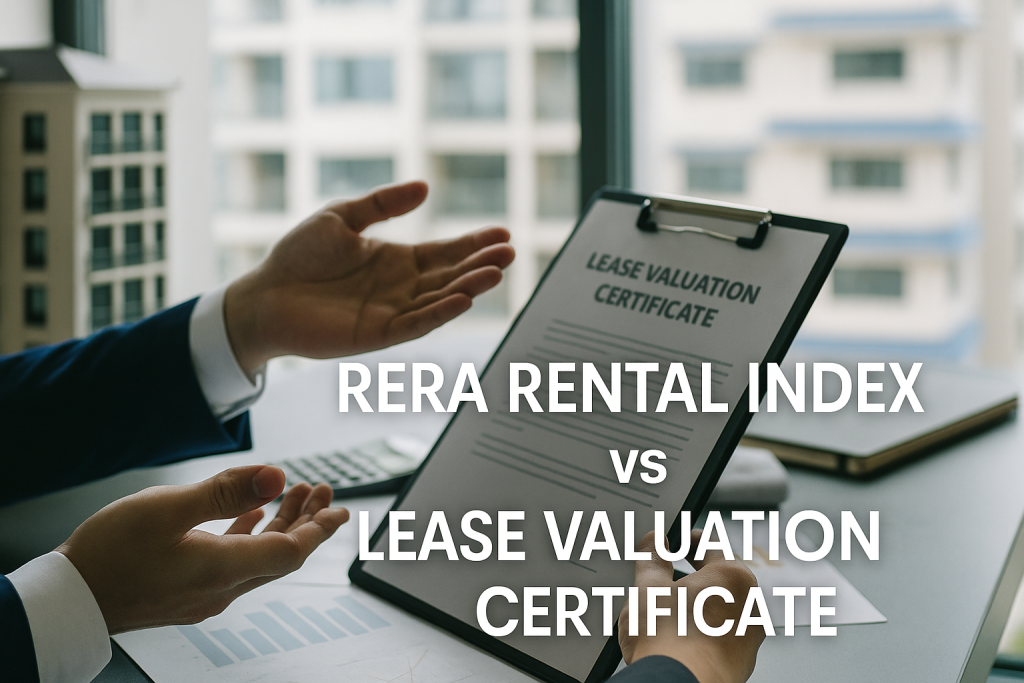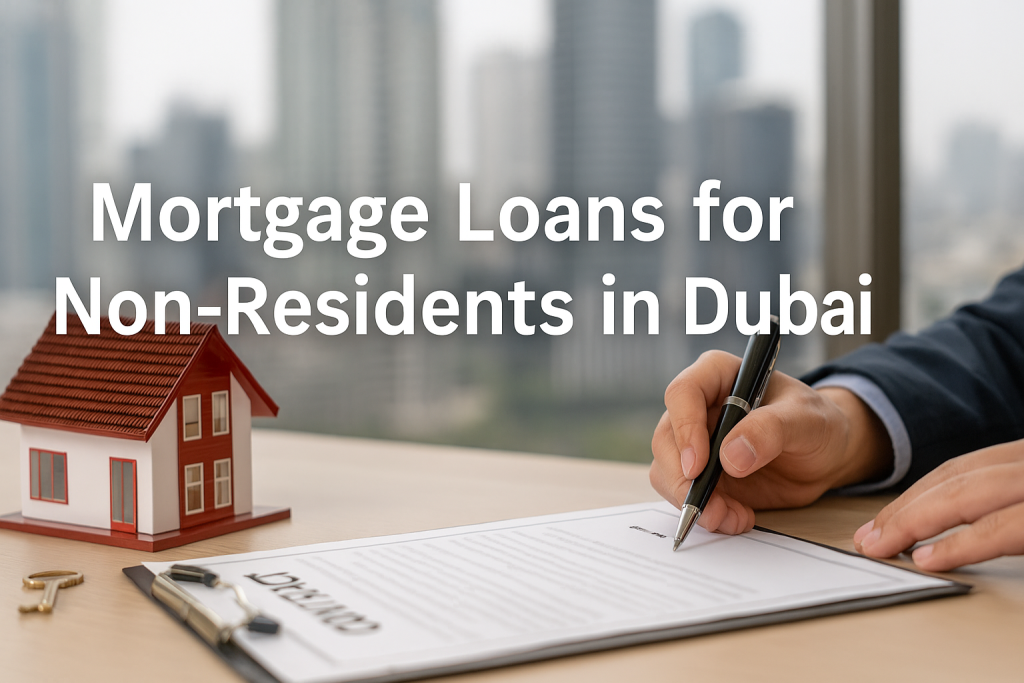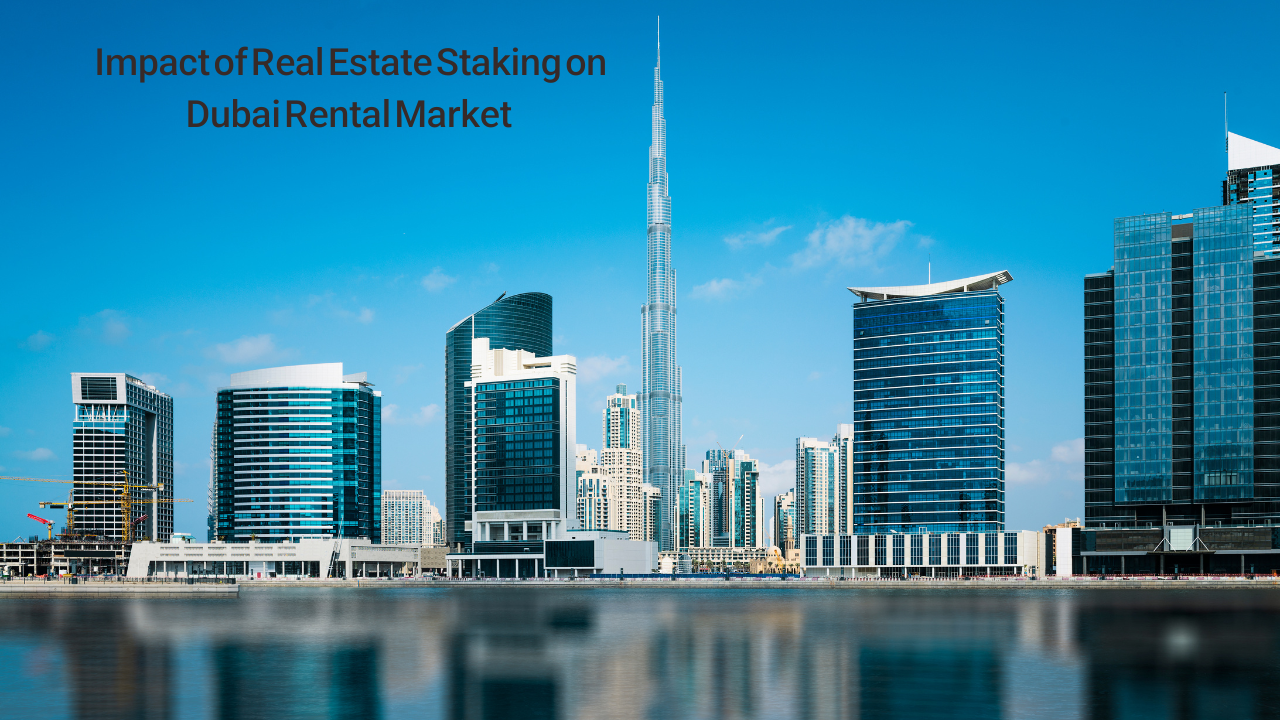

Dubai’s real estate market has long been known for its growth potential and high rental yields. As one of the most dynamic property markets in the world, it attracts a wide array of investors, from international buyers to local property enthusiasts. However, in recent years, the emergence of real estate staking has introduced a fresh perspective on property investment, particularly in the rental market.
Do you know Dubai’s real estate market offers the highest percentage gains and rental returns in the world!
You can pay in installments over five years, with starting prices at 250k and annual payments of 50-80k, with no bank needed
Join Telegram: https://t.co/FzNSIYqudf
— Doctor Profit 🇨🇭 (@DrProfitCrypto) October 11, 2024
Real estate staking offers an alternative to traditional property investment by allowing individuals to purchase fractional ownership in properties through tokenization. This form of fractional ownership provides investors with the opportunity to earn rental income without having to commit to the full purchase of a property. In this article, we will explore how real estate staking is impacting Dubai’s rental market, the benefits it offers investors, and how it is transforming the property landscape in the city.
What is Real Estate Staking?
Before diving into its impact on the rental market, it is important to understand what real estate staking actually entails. Real estate staking refers to the tokenization of real estate assets, which allows individuals to invest in fractions of a property instead of purchasing the entire asset. This means that investors can own a portion of a property, which entitles them to a share of the rental income and any potential capital gains, proportionate to their stake. Hence, real estate staking can help investors to achieve financial freedom
Key Features of Real Estate Staking:
- Fractional Ownership: Instead of investing in entire properties, investors can purchase shares or tokens representing fractional ownership.
- Blockchain Technology: Real estate staking utilizes blockchain technology to ensure transparency, security, and efficiency in the buying, selling, and transferring of property stakes.
- Rental Income Distribution: Investors receive a share of the rental income based on the percentage of the property they own.
By leveraging blockchain, real estate staking eliminates traditional barriers to entry, such as high initial capital requirements and the need for property management. It allows for seamless transactions and offers a more liquid and accessible form of investment in the real estate market.
How Real Estate Staking is Impacting Dubai’s Rental Market
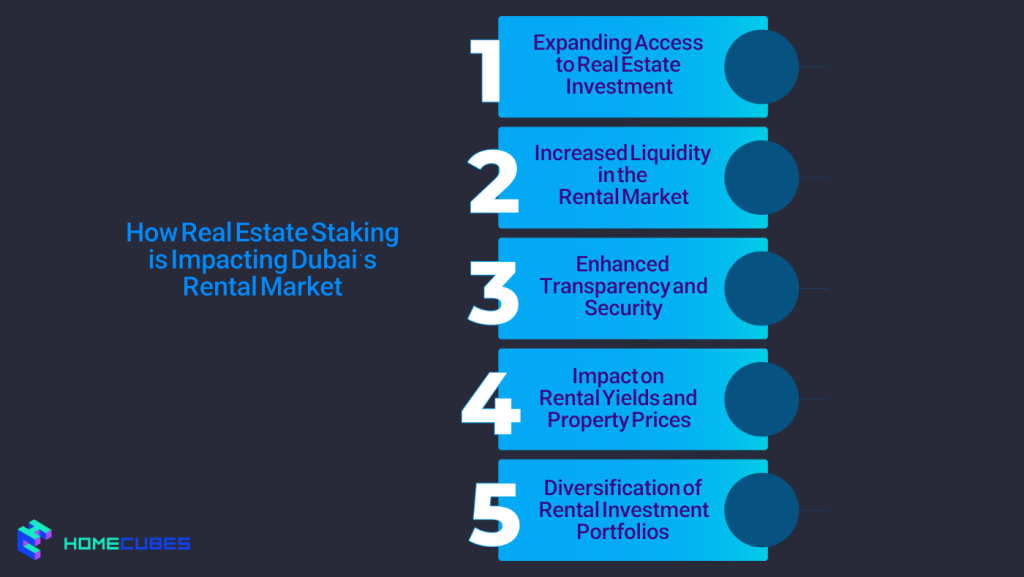
Expanding Access to Real Estate Investment
One of the most significant impacts of real estate staking on Dubai’s rental market is the democratization of property investment. Traditionally, the Dubai rental market has been reserved for high-net-worth individuals or large institutional investors due to the substantial capital required to purchase properties. However, real estate staking allows investors with smaller budgets to get involved in the market by purchasing fractional ownership in rental properties. By expanding access to real estate investment, staking introduces a new wave of investors to the rental market, which could drive demand and affect rental prices and yields in the city.
Increased Liquidity in the Rental Market
Liquidity has traditionally been one of the challenges in Dubai’s real estate market. Selling a property can take time, and rental properties often involve long-term commitments from both landlords and tenants. Real estate staking, however, offers increased liquidity by enabling investors to buy and sell their stakes more easily. For Dubai’s rental market, this means that investors can adapt to shifting market dynamics more rapidly, and rental property owners can access capital without being tied to a single asset for extended periods.
Enhanced Transparency and Security
Real estate staking in Dubai leverages blockchain technology, which enhances transparency and security in the rental market. In the past, property transactions have often been marred by opacity, high fees, and the potential for fraud. Blockchain technology solves these issues by providing a decentralized ledger of transactions. For investors in Dubai’s rental market, the transparency and security offered by real estate staking make it a more reliable and trustworthy form of investment. As more stakeholders adopt this technology, it is likely that the broader real estate market will become more transparent and efficient.
Impact on Rental Yields and Property Prices
The rise of real estate staking could have a significant impact on both rental yields and property prices in Dubai. As more investors participate in the market, the demand for rental properties could increase, driving up rental prices in certain areas. Conversely, real estate staking may also create opportunities for more affordable investments in properties that were previously out of reach. While the full impact on property prices will depend on the scale of real estate staking in Dubai, it is likely that the introduction of fractional ownership will lead to greater market activity, increased competition for rental properties, and potentially higher prices.
Diversification of Rental Investment Portfolios
Real estate staking enables investors to diversify their rental portfolios more effectively. In the past, investors seeking exposure to Dubai’s rental market had to commit significant capital to a few select properties. Now, with fractional ownership, they can invest in a variety of properties across different sectors (e.g., residential, commercial, industrial) and locations within Dubai. By enabling greater portfolio diversification, real estate staking is transforming the way investors approach rental property investment in Dubai.
The Future of Real Estate Staking in Dubai’s Rental Market
As the concept of real estate staking continues to gain momentum, its impact on Dubai’s rental market is expected to grow. The advantages of fractional ownership, increased liquidity, and enhanced transparency are likely to attract even more investors to the rental sector, contributing to the evolution of Dubai’s property market.
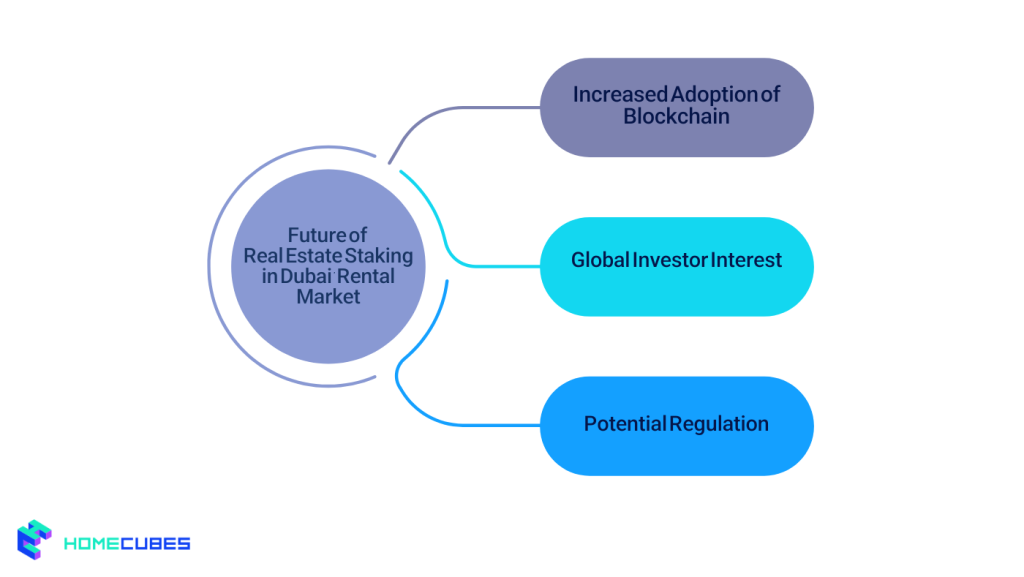
Key trends to watch:
- Increased Adoption of Blockchain: As blockchain technology becomes more widely accepted, more property developers and investors will embrace real estate staking platforms, further integrating fractional ownership into the mainstream market.
- Global Investor Interest: With Dubai’s global appeal, real estate staking offers international investors a streamlined way to participate in the city’s rental market, which could drive further demand for rental properties.
- Potential Regulation: As real estate staking continues to grow, regulators may introduce frameworks to ensure that it operates within the bounds of local laws and protects investors.
Conclusion
Real estate staking is a powerful innovation that is transforming Dubai’s rental market. By providing lower entry barriers, increased liquidity, enhanced transparency, and the ability to diversify investment portfolios, real estate staking is reshaping the way investors approach rental property in Dubai. As the market continues to embrace fractional ownership, it is likely that the impact of real estate staking will transform other sectors like retirement investment creating a more accessible and efficient rental market for all stakeholders involved.
Real estate staking could become a staple of Dubai’s rental landscape, offering exciting opportunities for both local and international investors seeking exposure to one of the world’s most lucrative property markets.
Homecubes, as a licensed fractional ownership platform focusing on the Dubai real estate market has defined a range of property tokenization projects in Dubai. Contact us confidently for further information about our lucrative fractional investment opportunities in Dubai.






